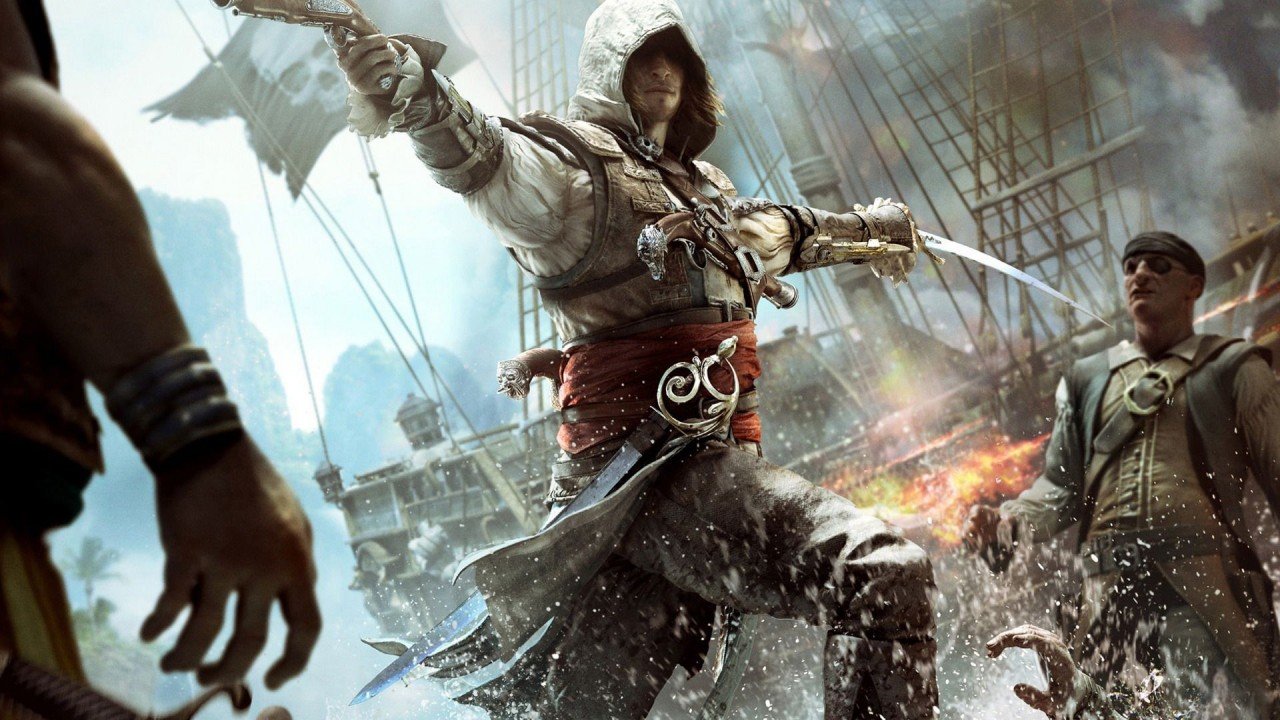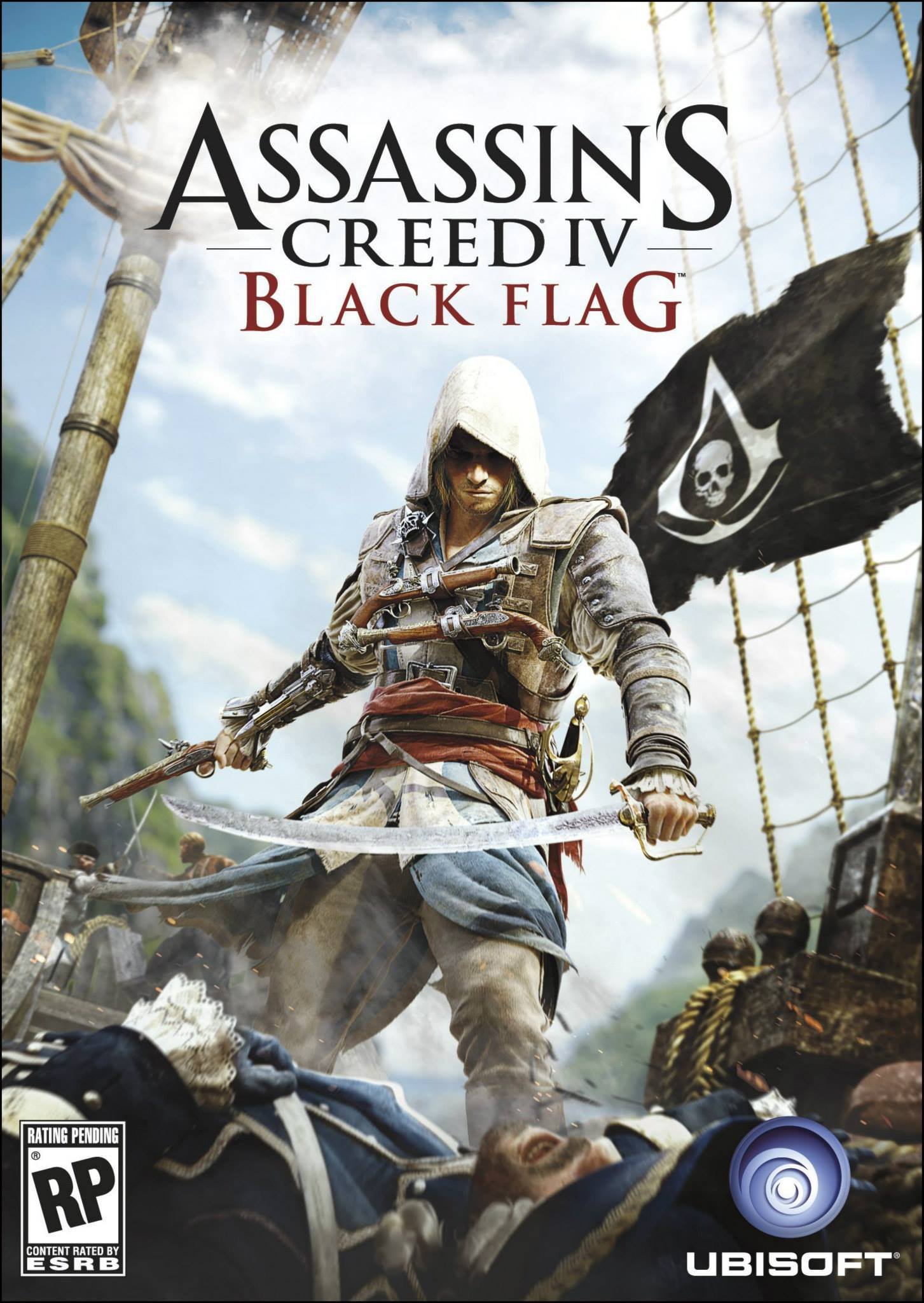The great danger of an annual series is familiarity. Unlike something like Grand Theft Auto, which is more like a movie event with anticipation that builds up over years between releases, games like Assassin’s Creed strip away surprise over time by providing the same experience every year. Call of Duty has recently tried evading this by taking the series first from WWII to the modern era, then the near future. Assassin’s Creed is now trying the same thing, by moving the focus away from land, and providing a pirate’s playground of pillaging, swashbuckling and plundering. The result is two decent, fragmented games that never really fuse into a great whole.
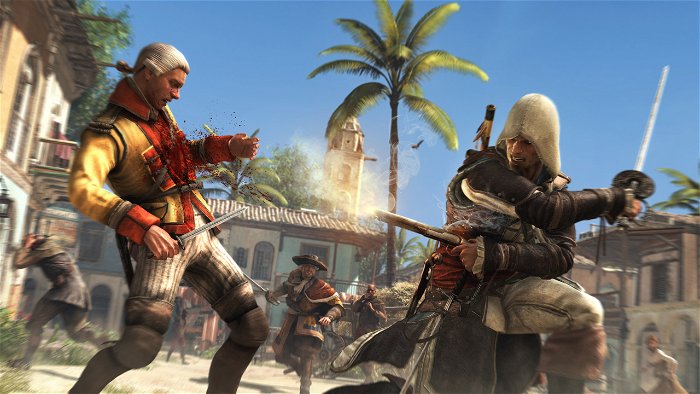
Assassins Of The Caribbean
Assassin’s Creed IV: Black Flag, is starting on a different—not necessarily fresh—slate for its story, with a new tale in the modern era, and a flash back into the past with Edward Kenway, grandfather of Conner Kenway, the hero of Assassin’s Creed III. It turns out that Edward was an aspiring buccaneer in his day who—largely through blind chance—impersonates an Assassin and eventually finds out he has an aptitude for the profession. The rest of the tale, in typical AC fashion, attempts to weave a historical narrative based on the pirates of the era, with the conspiracy of the Templars and Assassins, and the repercussions these variables have on the 21st century as the ancient, godlike culture known as the Precursors continue to influence events thousands of years after their demise. It’s fragmented, disjointed, and continues the AC storyline’s habit of not being able to piece its disparate plot points together in a convincing way. The strongest part of AC4’s story is—as with past games—the historical aspect, focusing on real figures of the period and trying to breathe drama and life into their recorded exploits.
Unfortunately, these genuinely interesting moments are undercut by attempts to jam science fiction and/or political conspiracy into the mix. It’s a shame that Ubisoft never had confidence in their audience to accept the intrinsic value of the AC series as historical games, but that’s what we have here; an occasional worthy tale undermined by narrative aspects that don’t fit well at all when combined. Ubisoft has also added a new, post-modern wrinkle to the modern day portion of the game. In the present day, players now take on the role of a researcher/game tester at “Abstergo Entertainment,” a game development studio that is probably based in Montreal, judging from the bilingual nature of the most of the staff. Here, the game takes on a self-aware note as players hack into the studios network, discovering developer commentary on everything from promotional strategies for games to audience reaction to game subject matter. It’s almost too clever for its own good as Ubisoft’s writers clearly seek to criticize certain decisions within the game industry, though it’s clear to most informed gamers that Ubisoft is just as guilty of these same commercial concerns they are waggling their fingers at.
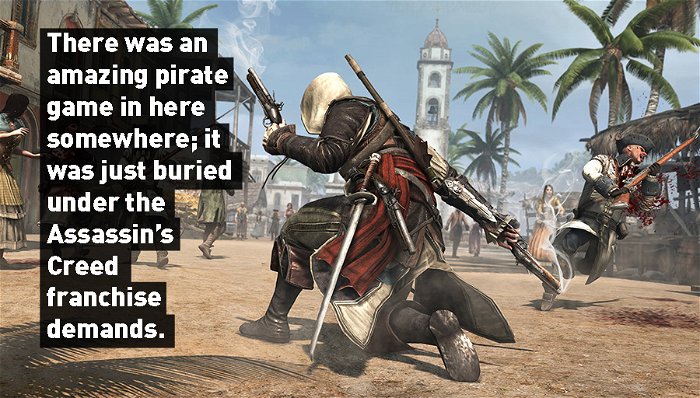
On the presentation side, it’s clear now that the technical ambitions of the AC series are outstripping the consoles of today. The PS3 version reviewed is clearly bursting at the seams to render this game, and occasionally fails. The game, while still pleasing to look at thanks to the talented art team, is struggling with regularity. In more populated areas, pop up of NPCs is apparent, the frame rate drops when moving at full speed—or even simply rotating the camera—and a bit of screen tearing occurs in these areas as well. Where the game excels (and this probably shouldn’t be a big surprise) is on the oceans, with fewer objects to render, and less NPC behavior to take into account. The character models, while not subpar, are also shown up by recent releases such as Beyond: Two Souls, which have much better, more evocative facial capture than AC4. As always, Ubisoft Montreal excels in art direction and even light, but the sheer size of AC4 is impacted by the limits of current hardware and will likely look—and perform—at much better levels on the PS4 and Xbox One.
The audio in AC4 is up to Ubisoft’s usual high standards. The score for the game is evocative, borrowing instruments from the period and even incorporating male choral accompaniments for pirate sea shanties. The sound effects are a treat for players, with crashing waves, howling winds, and big, meaty, bass-y cannon fire that takes good advantage of sound systems. The voice acting is also kept to a high standard, with the actors giving good performances in a wide variety of accents that sound authentic.
It’s An Annual Release
As with Guitar Hero, Tony Hawk and of course, Call of Duty, AC4 is part of a yearly franchise. Despite the number, it’s actually the sixth release in the main series, and it shows. The problem with sticking to an annual release—even for a team as large as Ubisoft Montreal—is that so much work needs to be done just to generate new content that very little work can be done to improve other areas, especially game mechanics. AC4 epitomizes this, with a patchwork of game mechanics taken from all the past games painted in the bright blue colors of the West Indies, but otherwise offers little that’s new for fans, and most disappointingly of all, doesn’t even integrate these existing mechanics very well.
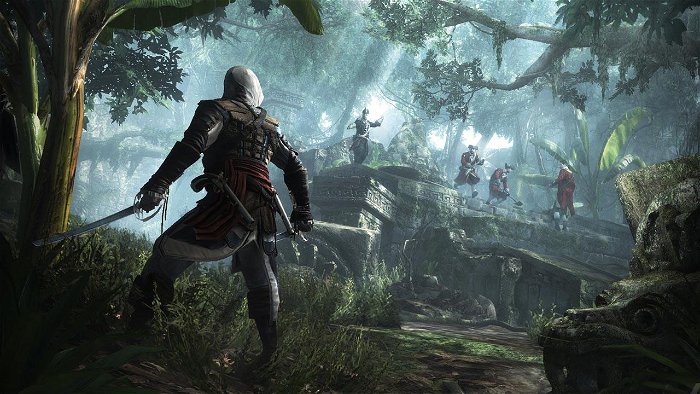
The basic traversal mechanics tweaked from AC1 onwards are all here, as is the collect-a-thon from past games, with the gathering of animus fragments, buried treasure and even sea shanties to give players a reason to explore the large world. The towns of the West Indies, set in the 18th century, bear a lot of similarity to the colonial buildings of AC3, while upgrading towns makes a reappearance from AC2 and subsequent sequels. The problem is they feel like separate games, with the collecting having little relation to the assassinating, which in turn seems to have no relevance to the exploration. This is especially true of the latest addition, the expanded naval mechanics from AC3. The new pirating /naval elements feel like a more streamlined version of Sid Meier’s Pirates!, a game which was undoubtedly a massive design influence on this latest Assassin’s Creed title. They’re clearly the highlight of the game though, offering sailing, ransacking of unsuspecting cargo ships and even less savoury activities such as the controversial whale hunting element, or diving underwater to loot wrecks.
That is the foundation dilemma of AC4. On the one hand, there is a traditional AC game here, with the stalking of targets, the melee combat, and the rooftop scaling and traversal. On the other hand, there is a game where you take to the seas in your ship, trade cannon fire with frigates and or even chase after your own personal Moby Dick. They feel like two distinct games. Much like Edward Kenway, who wanted to be a pirate before stumbling into the AC conspiracies, this game has a promising action/pirate simulator that’s been arc welded to the traditional AC mechanics it’s far from a smooth fit.
Even the conventional elements of the AC series struggle to find a place within this game as they fight with familiarity. For example, AC4 relies too much on the “stalking” phase of an assassination, forcing the player to remain in hiding while shadowing a target for information. In almost every chapter of the game, this mechanic repeats itself, a far cry from the mission variety of AC2, which had players perform any number of different tasks before finally experiencing an elaborate assassination set piece. AC4—again, likely due to time constraints—follows a predictable pattern simply because it’s easier to create missions that follow the same general structure and use the same mechanics when there’s a looming deadline to make a game ship. Even the multiplayer, which still retains the originality and fun of its first debut in Assassin’s Creed: Brotherhood, is not really offering anything new aside from some tweaks to its COD-esque perk/leveling system, and a “Gamelab” feature that allows players to create custom rounds with new win/play conditions.
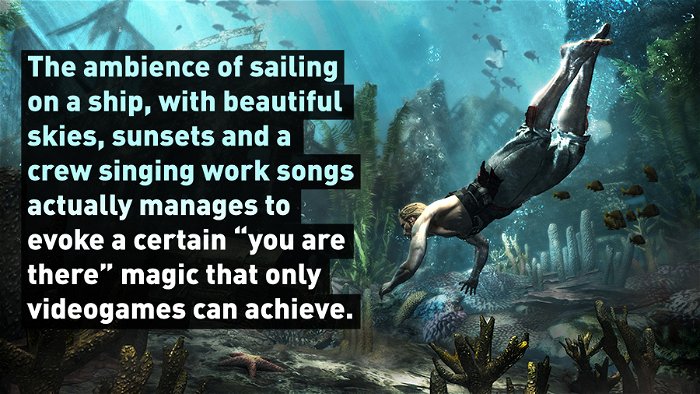
There’s a lost opportunity here. Had the newer naval/pirate mechanics been allowed to stand on their own and be a “pure pirating” simulator like Sid Meier’s 1987 original, there might have been outstanding game that provided a truly new experience for the audience. The ambience of sailing on a ship, with beautiful skies, sunsets and a crew singing work songs actually manages to evoke a certain “you are there” magic that only videogames can achieve. But just when it feels like AC4 is transporting you to new places and adventure, the hero Kenway is forced once again to free run through trees following a victim and listening to more conspiracy conversation.
Mechanically, Assassin’s Creed IV: Black Flag is not a bad game. All of its design elements work, and despite some performance issues, it looks good and functions competently. But its many familiar elements are starting to show their age, and don’t integrate well with the pirate theme, which seems to want to be a different, more interesting game entirely. In many ways, this game would have benefited greatly from jettisoning both the mechanically tired AC design elements, and the narratively incredulous Templar/Assassin/First Civilization storyline that has been getting less sustainable with each new game. There was an amazing pirate game in here somewhere; it was just buried under the Assassin’s Creed franchise demands.
